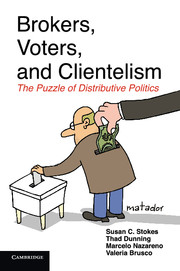Book contents
- Frontmatter
- Dedication
- Contents
- List of Tables
- List of Figures
- Preface and Acknowledgments
- I MODALITIES OF DISTRIBUTIVE POLITICS
- II THE MICRO-LOGIC OF CLIENTELISM
- III THE MACRO-LOGIC OF VOTE BUYING: WHAT EXPLAINS THE RISE AND DECLINE OF POLITICAL MACHINES?
- 7 Party Leaders Against the Machine
- 8 What Killed Vote Buying in Britain and the United States?
- IV CLIENTELISM AND DEMOCRATIC THEORY
- Appendix A: Argentina Brokers' Survey
- Appendix B: Argentina Voters' Surveys
- Appendix C: Venezuela Voters' Survey and the Maisanta Database
- Appendix D: India Voters' Survey
- References
- Index
- Miscellaneous Endmatter
8 - What Killed Vote Buying in Britain and the United States?
Published online by Cambridge University Press: 05 June 2014
- Frontmatter
- Dedication
- Contents
- List of Tables
- List of Figures
- Preface and Acknowledgments
- I MODALITIES OF DISTRIBUTIVE POLITICS
- II THE MICRO-LOGIC OF CLIENTELISM
- III THE MACRO-LOGIC OF VOTE BUYING: WHAT EXPLAINS THE RISE AND DECLINE OF POLITICAL MACHINES?
- 7 Party Leaders Against the Machine
- 8 What Killed Vote Buying in Britain and the United States?
- IV CLIENTELISM AND DEMOCRATIC THEORY
- Appendix A: Argentina Brokers' Survey
- Appendix B: Argentina Voters' Surveys
- Appendix C: Venezuela Voters' Survey and the Maisanta Database
- Appendix D: India Voters' Survey
- References
- Index
- Miscellaneous Endmatter
Summary
INTRODUCTION
In nineteenth-century Britain and the United States, vote buying was commonplace. Parties gave voters cash, food, alcohol, health care, poverty relief, and myriad other benefits in exchange for their votes. To gain leverage over them, parties gathered information about voters' debts, their crimes, even their infidelities.
Today, these forms of distributive politics have basically disappeared from both countries, as they have from most other advanced democracies where they once were practiced. Although money shapes politics in twenty-first-century Britain and even more so in the United States, the practices of clientelism have virtually disappeared. The details of electoral corruption in nineteenth-century Britain and America therefore have a startling feel today. Consider some examples:
• A commission on electoral bribery reported to the House of Commons in 1835 that, in Stafford, £14 were paid per vote cast in a hotly contested election. Polling proceeded over several days, and electors were called to cast their vote in alphabetical order. Those with surnames beginning with A's and B's didn't get much for their votes, “but if the polling lasted two days, the names which began with an S or a W were of the greatest value.” “At Leicester,” also in 1835, “as soon as the canvass began public houses were opened by each party in the various villages near the borough. The voters were collected as soon as possible, generally locked up until the polling, and according to an election agent, [they were] ‘pretty well corned.’”[…]
- Type
- Chapter
- Information
- Brokers, Voters, and ClientelismThe Puzzle of Distributive Politics, pp. 200 - 242Publisher: Cambridge University PressPrint publication year: 2013
- 4
- Cited by



